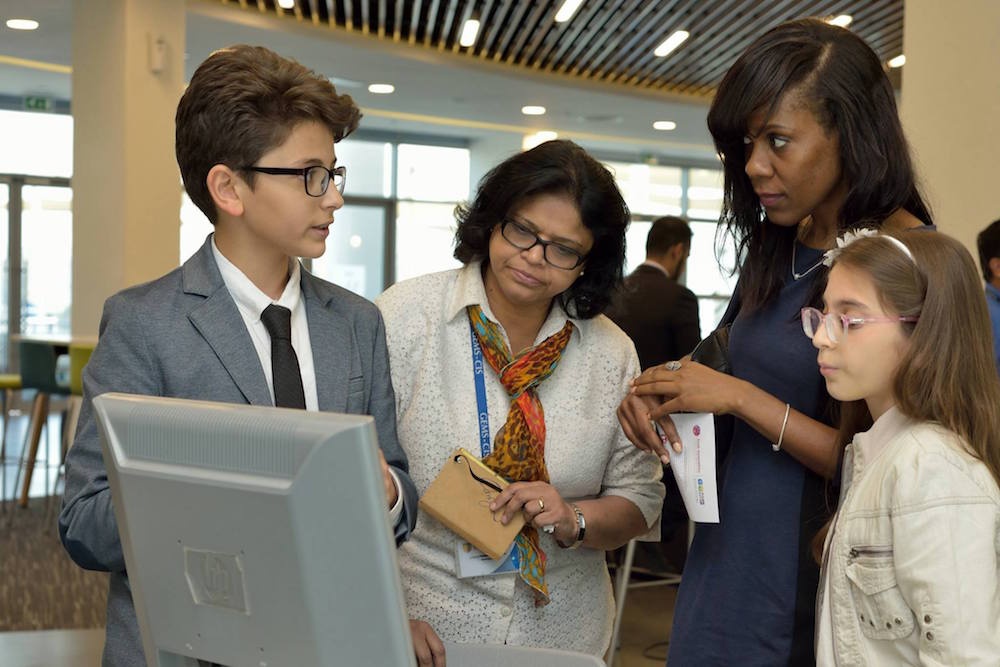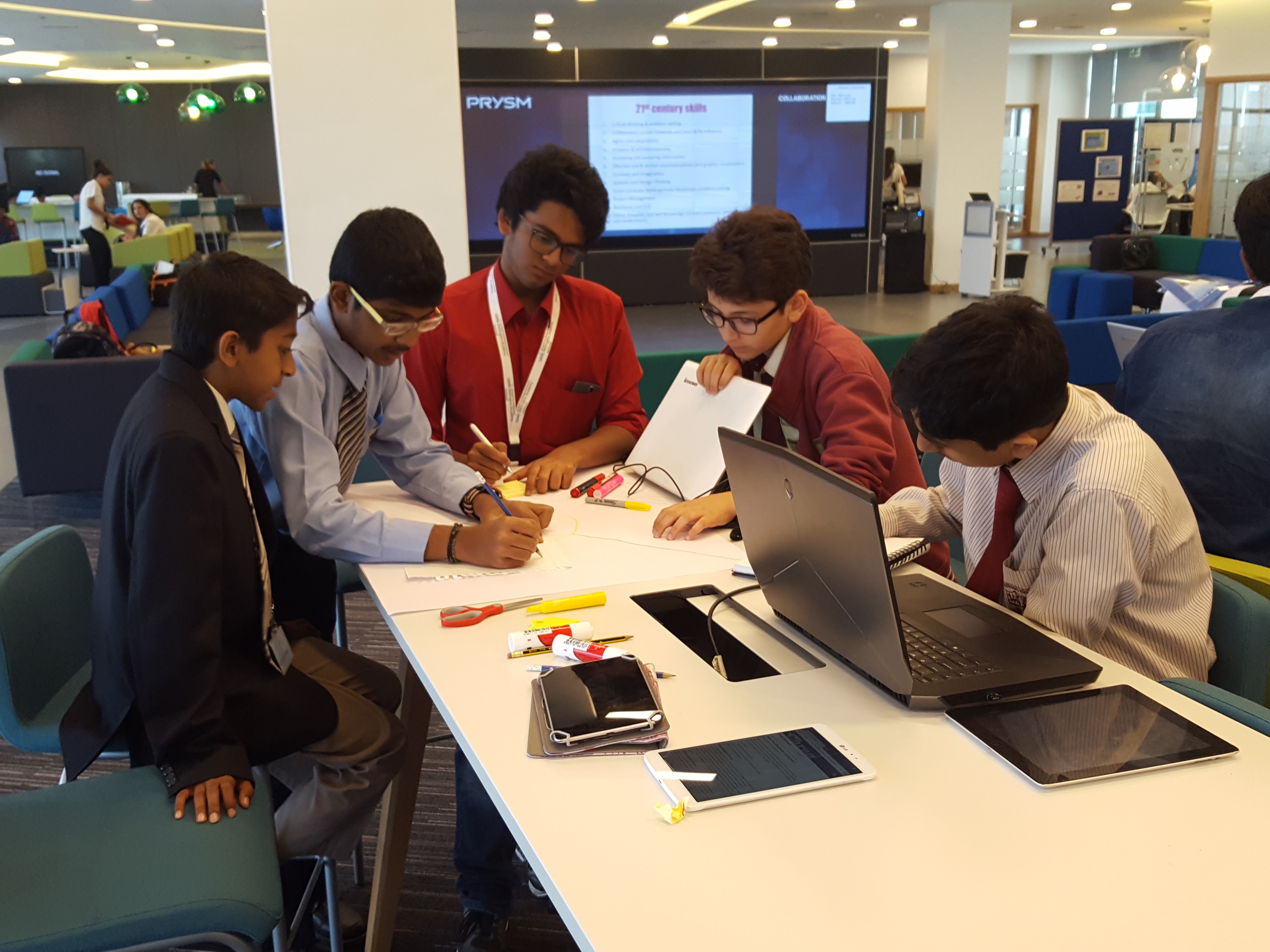All work, all play: the future of tech-powered education in the UAE

For many, modern day classrooms look nothing short of an overreaching sci-fi movie scene: children as young as eight talking code, gamified e-learning platforms, and robots for school projects.
So, the urgency to teach children so much so early on is not without reason - the future job market is highly demanding, built on the brainpower of creators that need to master data and technology as much as they do times tables.
As a result the need for educational organizations with weight and scale in the UAE market to include new age STEM subjects in schools requires far more than a curricular update. It is then coupled with hefty investments into tech resources, talent development, digital classrooms and, most importantly, the transformation of once inflexible educational models.
It is an effort that Gems Education, one of the UAE’s and the region’s largest and oldest homegrown educational organizations (started in 1959) - with over 90 schools in the region, 47 of which in the Emirates alone - has been leading.

Building the learning ecosystem from funnel to tunnel
In late 2012, Phil Redhead, who had initially joined the organization as a teacher, was tasked with a larger advisory role for digital learning at Gems.
“Back in the day, it was more about bring-your-own-technology policies and tech integration into the curriculum.” With this learn-as-you-go approach, latching tech onto traditional educational models failed on many counts. Gems had to rethink its digital transformation on a more seamless, scalable ecosystem level, Redhead told Wamda. He now heads the digital strategy team as senior manager.
Embedded into the Gems IRD (innovation, research and development) arm, and supported by their IT department and the TELLAL (Teacher Learning and Leadership for All) Institute, Redhead’s team has built its strategy from broad to targeted objectives. Today, “a prerequisite for any [Gems] student is the digital citizenship curriculum, which ensures the safe and responsible use of online media and heavily involves teachers, as well as parents.” Then, comes a more focused two-fold undertaking: promoting online and blended (offline and online) learning through a facilitative ecosystem of platforms, and structuring an entirely new model of teaching, learning and assessment.

(Image via Dayofdubai.com)
Gems sifted through 60 third-party providers for an online learning platform that would be flexible enough for schools to integrate into and personalize their ecosystem around – an example of which is My Learning, a platform that enables teachers to create personalized content for students. “Where tech integration has failed, it was because it was under the traditional model of learning. To leverage technology in the learning process, you have to transform everything, from the way the physical space is organized, to the way teachers assess, to how timetables are structured,” Redhead told Wamda.
GEMS’ investments into this transformation have been many. In 2014, Wellington Academy (a Gems school) partnered with Pamoja, the only International Baccalaureate (IB)-approved online course provider. A year later Blended Learning Plaza was launched, offering students of the academy access to digital and software tools in an offline space. As a result of such efforts, “students are reporting that they have more time and freedom,” Redhead said.
An educational trend
For the UAE’s innovation-led ambitions, the legwork on transforming textbook into tech-powered education is top priority - it is one of Dubai Future Foundation’s (DFF) recently announced seven challenges. Under the Dubai Knowledge and Human Development Authority (KHDA), the challenge, as stated by the DFF, is to “test 21st century assessment systems and personalized learning solutions that work across curriculums”.
Following DFF’s announcement of its partnership with Werobotics, a US-based robotics robotics accelerator and community for developing countries, which will see their Flying Labs help scale robotic solutions from the UAE onto projects in developing countries.
It’s a far cry from 2010, when Fun Robotics was the only initiative of the sort in town. Started as a pop-up concept to raise awareness of robotics amongst children, the project turned into the first KHDA-approved specialized robotics center in Dubai, shortly after the 2012 launch of the Mohammed bin Rashid Smart Learning Program. Since then, both traditional and modern initiatives - including SAE Institute, Metamindz, and Noah’s Ark Training Institute - followed suit, designing either the entirety or a sizeable part of their curriculum around STEM subjects.
Those who can’t do, can’t teach
Admittedly, blended and online learning has been a hard sell to teachers, who are skeptical of education tech compromising both students’ learning outcomes and their own incomes. “Teachers are not resistant to technology for the sake of it, but because they want the best for their students,” says Redhead.
It is a lesson that Itworx Education, a MENA-based educational software solutions provider, learned in its very early stages. Today, its products range from learning platforms such as Learningcurve, to classroom software solution Netsupport, to digital e-content repository Edushare, to social learning space Winjigo.
Speaking code
The integration of 21st century tech and hardware subjects into e-learning platforms might be a premature conversation, but into offline learning, it is not. “Kindergarten children are learning coding with their bodies. We’re talking about the curriculum being delivered in three languages: Arabic, English and code,” says GEMS’s Redhead.
GEMS is also tapping into several initiatives and partners such as CS unplugged, Lego Education, GE, Microsoft and even TedX, all to “hack the classroom” with design thinking, robotics and 3D-printing, among other areas.

They are investing also. Karan Deep, a GEMS graduate, started his career with the school as a business and tech analyst. Today, as IRD’s innovation development manager, his branch is more of a “VC team with a focus on early stage investments – seed or series A – into tech that would be good for our schools, and digital collaborative tools providing more personalized education.”
While Deep does not divulge the startups in which GEMS has already invested, he says the school will help co-create startups and pilot-test them; partly because “[tech entrepreneurs] are very great programmers and they know how to build things, they build what they think education can be.”
Enter GEMS’ Arab Innovation Center for Education (AICE), co-launched with the UAE prime minister as a platform for innovation and entrepreneurship centered around four pillars: space and academy, research, testing and prototyping, and incubation.
As part of AICE they created an accelerator program, which has, out of 700 applicants across GEMS schools, already paired 10 selected student teams with outside incubators and mentors such as Womena, Impacthub and Turn8. Accelerated projects featured everything from automated thermal regulating systems to intelligent irrigation systems. The winning project, ODI, a wearable device for visually impaired people that can detect static obstacles and alert users with vibrations and voice notifications, received 10,000 dirhams in seed funding, its creator now receiving assistance to fine-tune his invention. “We will start small but want to scale it to the community,” says Deep.
Slowly but surely, the UAE education ecosystem is setting children up for a tech-powered entrepreneurial future, but it needs to future-proof itself first. “I wouldn’t hesitate to say that Dubai will be the next Silicon Valley in a few years. I was a judge in the AICE accelerator program and met a kid who used nine programming languages, all self-taught.”


